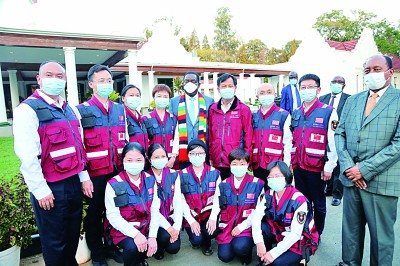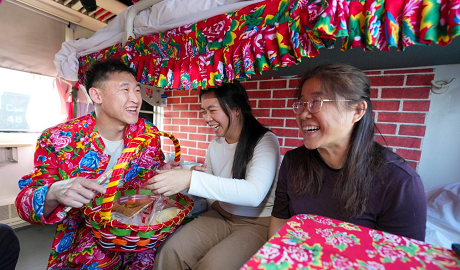


DAWEI: Strategy to fight the Recession: On April 14, IMF predicted that the global economy will shrink by 3% this year, and it will be the worst economic recession since the depression in the 1930s. What is your point of view? What factors will affect the world economy in the next few years? What is the best strategy for the future global economy? I love your EE strategy - education and economy)
John Naisbitt: A basic rule is that we cannot understand new paradigms while holding on to old paradigms. The global economy will shrink more than 3 percent, but the overall number does not define how a country, an industry or a company will do. Emerging economies have been hit very hard, several sectors such as the hospitality industry, air-travel and fossil energy are among the hardest hit sectors and will face long term disruptions There is though, an overall strategy to get out of the downturn cycle. It is boosting innovative ideas and facilitating their implementation. The enablers are what we call the two big EEs: Education and Economics. The better the education system of a country, the higher is its potential to navigate through difficulties. That is true in good days and even more in times of crisis. The two big EEs, education and economics are inseparably bound together.
Doris Naisbitt: How to manage and overcome the COVID-19 crisis will lead to different answers. It will depend on the national, political, scientific and economic lenses one looks through. But COVID-19 also is teaching us a lesson. Political AND economic leaders need to act when a potential threat is first identified. There is no time to wait and see how it develops as it was possible with other threats that have hit us in the past.
John Naisbitt: Therefore we see three future key elements in leadership:
1. To constantly scan the global environment and anticipate trends
2. To act immediately on external threats and opportunities
3. To balance the risks of equally demanding alternatives – now especially public health protection versus economic performance protection.
Doris Naisbitt: And - on a micro base, leadership means that we need a stronger awareness of our responsibility for what we contribute to the good or bad of the whole.
DAWEI: Globalization: It is seen that some governments and media that once support "globalization" have continuously questioned "globalization" in recent years. Popularism and protectionism are back. This virus outbreak might be the milestone or turning point of the globalization, what do John and Doris think?
Doris Naisbitt: Populism does not offer solutions but an opportunistic dramatization of a situation to benefit own interests. COVID-19 has hit all nations, and opportunistic leaders saw the chance to feed into fear and thus politicize and exploit the virus. Against all previous politics, the loudest populist calls are now coming from the US - a nation which not long-ago favored globalization. In 2001, when China joined the WTO, the concern we heard in Beijing many times was: will globalization mean Americanization. No one would ask that question today. The real turning point was the rise of China.
John Naisbitt: And it did not come as a surprise. Already in 1995, our book China’s Megatrends offered an outlook into the coming shift in geo-economic power. In 2015, our book Global Game Change described China as the leader in reshaping the global economic and political landscape that stands for integration and cooperation in many fields – industries, societies, cultures, institutions and individuals. COVID-19 is just another steppingstone in the rising awareness that globalization does not mean a world in which the West sets the rules. The US and the EU are feeling a much greater dependence on China. The old paradigm of economic and technological supremacy of the West can no longer be sustained. COVID-19 has encouraged European political leaders to make verbal commitments for stronger support of innovative companies and start-ups to balance a too strong dependence on Chinese technology and products. The global pandemic though will have a massive impact on Chinese FDI (Foreign Direct Investment). And Chinese FDI is already showing the lowest numbers in a decade in the first quarter of 2020.
Doris Naisbitt: Nevertheless, cooperation among Chinese and foreign enterprises, universities and governments must and will continue, mostly to the benefit of all parties. The European call for a higher self-sufficiency as a result of COVID-19 is not negative. It is also a wake-up call for innovation. Despite all proclamations and goals, globalization cannot be turned on and off depending how the winds of change are blowing. Our economies are much too much interconnected to disengage at once.
DAWEI:During the outbreak of the global epidemic, some countries have made decisions to withdraw their companies from the host countries. Would that be a major setback to global economy?
John Naisbitt: That depends on the value and virtue of the companies and the importance of the enterprise for the host country. In general, foreign investors are now navigating in unchartered waters. No one can seriously predict the post-pandemic global economy. The UN’s trade and development arm predicts a 30 to 40 percent contraction in FDI. Just one year ago, Chile’s Foreign Direct Investment Promotion Agency for example hosted 300 investors of 21 nations in Santiago, advancing more than USD 7 billion projects. Today, such roadshows are a picture of the past. A big setback in a country which is taking part in China’s Belt & Road Initiative.
Doris Naisbitt: Nevertheless, we cannot make conclusions on such a situation when the decision-making processes of enterprises in general are based on long-term strategies. We all know that depending on how the global community will handle COVID-10 pandemic, how fast a vaccine or a cure can be found, will lead to further decline or a solid rebound.
It takes guts and good instincts to spot the opportunities this global crisis holds. Pessimism has never helped to overcome problems. In MindSet we wrote: “You do not get results by solving problems, but by exploiting opportunities.“
DAWEI: 2017, President xi, proposed a speech to Work Together to Build a Community of Shared Future for Mankind at the conference at the United Nations Office. He supports a world of common prosperity through win-win cooperation and support commitment to multilateralism. During the virus, China indeed donate medical equipment and experience to some nations. What’s your comment and suggestions China’s next step as a responsible leading nation?
Doris Naisbitt: If we would be able to learn lessons from history our world would in fact be a much better place. Most likely few leaders will disagree verbally that cooperation leads to much better results than confrontation. The difficulty lies in applying it in the economic and political reality. The undeniable accomplishment of the CPC was to turn China from dirt-poor to the, based on PPP, largest economy of the world. This offers an example that it is possible to overcome even the worse economic conditions. Which other nation but China could take the lead in helping developing countries to follow Chinas example?
John Naisbitt: We strongly agree with this, especially in the case of COVID-19 Chinese healthcare experts are sharing their experience with African health-care experts and Chinese entrepreneurs like Jack Ma are making personal commitments to help fight the pandemic. In its attempt to apply multilateralism China receives praise and faces hurdles. But it will be results that really count.
DAWEI:Some nation are challenging China’s work during the outbreak of the virus, as they believe virus is from China... what is your suggestion on China to deal with the hostile attitude?
John Naisbitt: As the rising power in the global community, China is gaining influence and respect on one side – and harsh criticism on the other. It is no surprise that also in the case of this pandemic, various conspiracy theories are spread in social media. The real danger is to politicize the problem.
Doris Naisbitt: Which brings us back to populists who do not offer solutions, but dramatize the situation for the advancement of their own interests. That in turn will lead to confrontation instead of creating co-operation.
John Naisbitt: President Xi’s call to “Build a Community of Shared Future for Mankind“, is now followed by the dramatic reality that the whole world is sharing the present and future consequences of the global COVID-19 pandemic. We can only hope that it will work as an undeniable sign that we need to learn how to talk with one another again and to collaborate on global challenges. This can become the foundation to improve established systems and globally allow new ideas to develop.
Doris Naisbitt: On a personal level it’s a reality that successful people will always face envy and distrust. But – strange as it might sound - envy is something that needs to be earned. It does not come with mediocrity. And what is true for people is true for peoples. The success of the Peoples Republic of China has and will be seen through different ideological lenses. But the Chinese people are proud of their country and its achievments, and that’s what counts.

Various festive events held across China to celebrate upcoming Chinese New Year


Hit epic drama sparks interest in lesser-studied chapter of ancient Chinese history

Lanterns hoisted to mark upcoming Chinese New Year in Hong Kong

"In-train fair" launched in NE China's Heilongjiang amid Spring Festival travel rush
点击右上角![]() 微信好友
微信好友
 朋友圈
朋友圈

请使用浏览器分享功能进行分享
